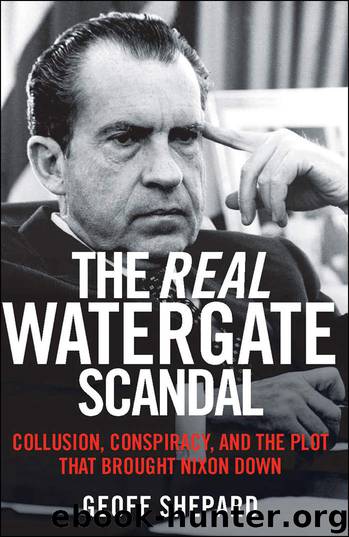The Real Watergate Scandal: Collusion, Conspiracy, and the Plot That Brought Nixon Down by Geoff Shepard

Author:Geoff Shepard [Shepard, Geoff]
Language: eng
Format: epub
ISBN: 9781621573869
Publisher: Regnery Publishing
Published: 2015-08-02T22:00:00+00:00
CHAPTER 7
EVENHANDED, NONPARTISAN PROSECUTORS
Equal protection of the law implies even-handed prosecutions for criminal conduct. But highly partisan WSPF prosecutors targeted Nixon’s top aides, charged them with highly questionable “thought crimes,” and improperly hid exculpatory evidence from their defense counsel.
CONSTITUTIONAL WEAKNESSES OF SPECIAL PROSECUTORS
The phrase carved into the west pediment of the Supreme Court building, “EQUAL JUSTICE UNDER LAW,” nicely captures the constitutional expectation of equal protection: the even-handed application of the laws. This is particularly true with regard to criminal laws, where the Fifth and Sixth Amendments come into play and prosecutions are expected to be nonpartisan.
JACKSON’S ADMONITION
The prosecutor’s challenge—and dilemma—was best articulated by Attorney General Robert Jackson back in 1940 in his address to the second annual conference of United States attorneys in the Great Hall of the Department of Justice. Soon to be appointed by President Roosevelt to the Supreme Court, where he served with distinction until 1954, Jackson would also the lead the U.S. prosecution in the war crimes trials at Nuremberg following World War II.
Jackson began his speech by asserting that U.S. attorneys, as federal prosecutors, have more power over individual Americans’ lives, liberties, and reputations than any other officials in the country. It is a question of discretion, he added, since there are so many federal offenses that could be prosecuted. And it is that discretion that poses a U.S. attorney’s greatest challenge.
If prosecutors can pick their cases, Jackson pointed out, they can also pick their defendants. That discretion is the greatest danger for American citizens, because a determined prosecutor can always find some charge to bring against an individual or group that he has decided he doesn’t like. It matters not whether the prosecutorial dislike stems from being unpopular with those in power, from holding the wrong political views, or even from somehow being in the way of the prosecutor himself.
Jackson emphasized that the greatest threats come in times of fear, when various groups might hunger for the scalps of people with whose views they disagree. He singled out “subversive activities” as being especially dangerous to civil liberties, since there was no agreed-upon definition for such actions. Jackson even observed, “We must not forget that it was not so long ago that both the term ‘Republican’ and the term ‘Democrat’ were epithets with sinister meaning to denote persons of radical tendencies that were ‘subversive’ of the order of things then dominant.”
Jackson’s words still rang true three decades later. In all periods relevant to the Watergate prosecutions, Jackson’s speech was featured prominently in the introduction to the United States Attorneys’ Manual, and it set the standard under which the laws of the United States were to be enforced by the Department of Justice.
But something changed in the years since Jackson’s admonition. A contemporary account by the lawyer, prosecutor, and novelist George Higgins describes the targeting of specific persons that characterized the Watergate prosecutions—which embodied everything that Jackson had warned against some three decades earlier.
The course of human events being what it is, the people who
Download
This site does not store any files on its server. We only index and link to content provided by other sites. Please contact the content providers to delete copyright contents if any and email us, we'll remove relevant links or contents immediately.
| American Revolution | Civil War |
| US Presidents |
Fanny Burney by Claire Harman(26594)
Empire of the Sikhs by Patwant Singh(23070)
Out of India by Michael Foss(16846)
Leonardo da Vinci by Walter Isaacson(13315)
Small Great Things by Jodi Picoult(7118)
The Six Wives Of Henry VIII (WOMEN IN HISTORY) by Fraser Antonia(5496)
The Wind in My Hair by Masih Alinejad(5086)
A Higher Loyalty: Truth, Lies, and Leadership by James Comey(4948)
The Crown by Robert Lacey(4805)
The Lonely City by Olivia Laing(4798)
Millionaire: The Philanderer, Gambler, and Duelist Who Invented Modern Finance by Janet Gleeson(4464)
The Iron Duke by The Iron Duke(4349)
Papillon (English) by Henri Charrière(4258)
Sticky Fingers by Joe Hagan(4188)
Joan of Arc by Mary Gordon(4099)
Alive: The Story of the Andes Survivors by Piers Paul Read(4017)
Stalin by Stephen Kotkin(3956)
Aleister Crowley: The Biography by Tobias Churton(3628)
Ants Among Elephants by Sujatha Gidla(3459)
